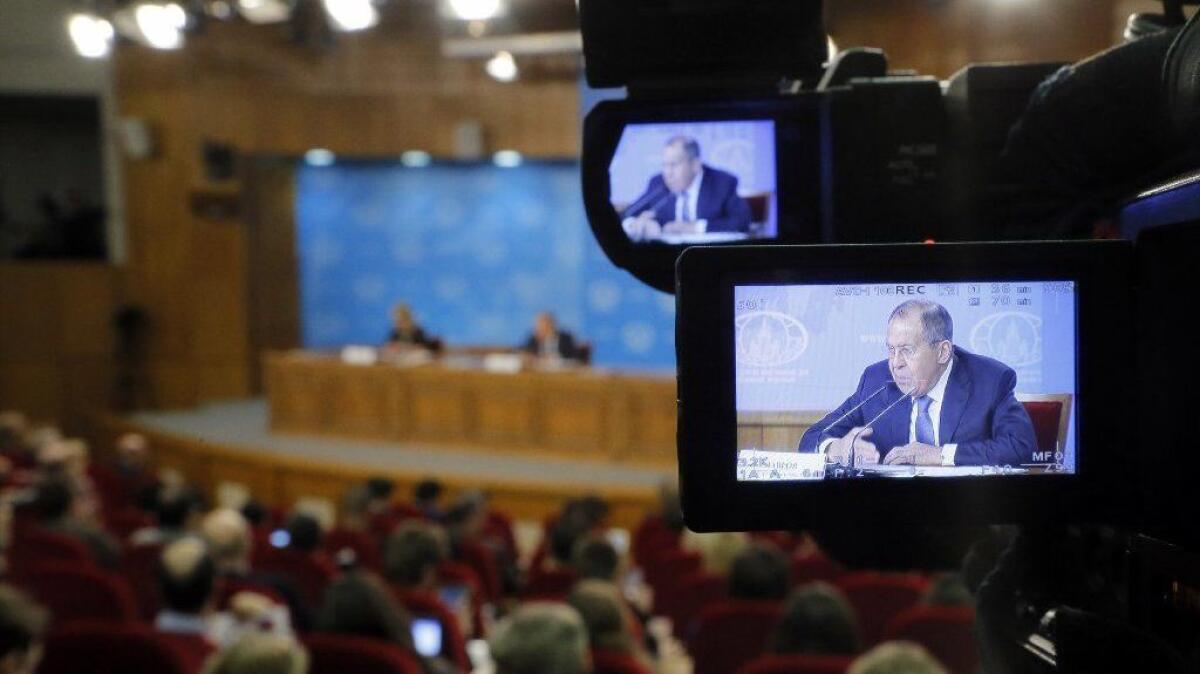U.S. must accept a new, multipolar world order, Russian foreign minister says

- Share via
Reporting from Moscow — Russian Foreign Minister Sergei Lavrov sharply criticized the United States for being a destabilizing force in the world, saying Washington was provoking North Korea into a military confrontation and attempting to derail the Iran nuclear agreement.
Despite the Kremlin’s attempts to rebuild bilateral relations with Washington, the United States continues to push an anti-Russia agenda aimed at undermining Moscow’s emergence as a global power in a multipolar world, the foreign minister said during his annual press conference.
Lavrov addressed a broad list of topics during the two-hour-long conference, including relations with China, Europe and the crisis on the Korean peninsula. With nearly every topic, his answers inevitably returned to what has become a familiar theme from the Kremlin: Washington’s aggressive attempts to push its agenda globally are failing and, in the case of North Korea and Iran, have become potentially dangerous.
“Unfortunately, our American colleagues still want to operate only on the basis of dictating policy, issuing ultimatums, they do not want to hear the perspectives of other centers of world politics,” Lavrov said.
The United States needs to face the difficult reality that it is no longer the world’s only superpower and adapt to an increasingly multipolar world, Lavrov said.
Lavrov’s comments came ahead of a new round of U.S. sanctions against Russia for allegations that the Kremlin orchestrated a campaign to interfere in the 2016 presidential election. The Kremlin denies the accusations.
On North Korea, Lavrov accused the United States of provoking tensions by stating that a military option is still on the table and by conducting military exercises on the Korean peninsula.
Kremlin accuses U.S. of anti-Russia fearmongering after State Department travel warning »
President Trump, in several outspoken tweets, has lambasted North Korean leader Kim Jong Un for Pyongyang’s missile tests. This month, Trump boasted in a tweet that he had a bigger nuclear button than the North Korean dictator.
“The United States quite plainly says that the military confrontation is inevitable, however, everyone understands the catastrophic consequences of such recklessness,” Lavrov said, referring to Trump’s statement.
Russia and China have both said they support talks between the two Korean nations, Lavrov said. Although Lavrov did not mention it, Trump has also praised the talks.
On Iran, the Russian foreign minister chastised a White House suggestion that it could rewrite the 2015 nuclear agreement with Iran brokered by former President Obama. That agreement lifts sanctions on Iran in exchange for restrictions on Tehran’s nuclear program.
Trump last week waived sanctions under the deal, but suggested that he would not do so again, saying he wants to rewrite the agreement’s “terrible flaws.”
Lavrov warned Washington not to back out.
“We will not support what the United States is trying to do, changing the wording of the agreement, incorporating things that will be absolutely unacceptable for Iran,” Lavrov said.
Changes to Iran’s nuclear agreement with the United States could have broader negative effects, namely on North Korea, which could view Iran’s experience as a cautionary tale with implications for its own approach to the West, Lavrov said.
“It’s sad that the United States once again gives a reason to doubt their ability to be reliable contract partners,” Lavrov said.
While not naming Trump directly, the foreign minister said the current White House was continuing an anti-Russian agenda set out by the Obama administration.
He pointed to U.S. sanctions on Russia’s energy sector and the military industry as two examples of areas in which Washington has acted to hinder Russia’s growth. The United States and the European Union have placed economic sanctions on individuals and state-run companies in these two Russian sectors in retaliation for the Kremlin’s 2014 illegal annexation of Crimea.
Russia has insisted that Crimea’s referendum vote in March 2014 to leave Ukraine and join Russia was legitimate and in reaction to a Western-supported coup in Kiev, Ukraine’s capital, which ousted a Moscow-favored president in February of that year.
Lavrov said he believed the sanctions on Russia were aimed more at boosting American’s position in the gas sector as well as at preventing Russia from securing a foothold in international weapons sales.
He accused the United States of trying to persuade the European Union not to complete a proposed gas pipeline that would divert Russian gas from pipes running through Ukraine.
“I would say that the [U.S.] administration’s actions indicate the fear of honest competition in a whole number of spheres,” Lavrov said.
In addition to economic sanctions, he said he sees the U.S. move to require Kremlin-owned media outlets such as RT and Sputnik to register as foreign agents in Washington, as well as the International Olympic Committee’s decision to ban Russian athletes from competing under their own flag in South Korea next month, as part of an orchestrated effort to unfairly punish Russia.
The International Olympic Committee in December announced that Russia would not be able to compete as a national team because of what the World Anti-Doping Assn. called a state-sponsored doping scheme. Russia athletes who test positive are banned from competing in South Korea, while players and teams who test negative may participate only as “athletes from Russia” under the Olympic flag.
“Yes, there are the facts of violations made by our athletes, but no collective punishment has ever been imposed on anyone in such cases,” Lavrov said. “Here I also see the fear of honest competition.”
Twitter: @sabraayres
Ayres is a special correspondent.
More to Read
Sign up for Essential California
The most important California stories and recommendations in your inbox every morning.
You may occasionally receive promotional content from the Los Angeles Times.











